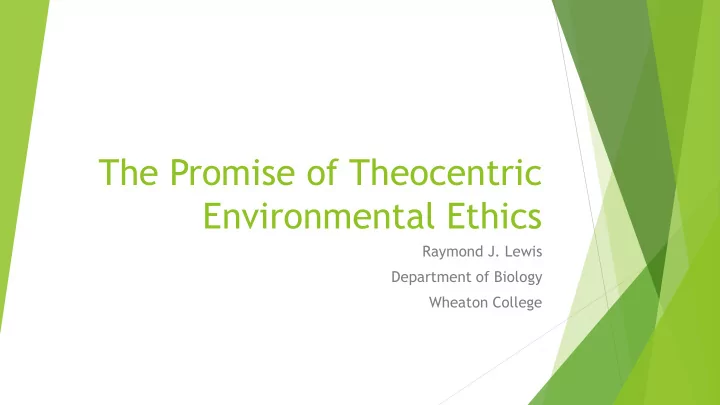

The Promise of Theocentric Environmental Ethics Raymond J. Lewis Department of Biology Wheaton College
Some definitions: Ethics “a set of moral principles” “a theory or system of moral values” (Merriam-Webster dictionary) Environmental Ethics
Environmental Ethics -can be characterized across a spectrum Anthropocentric Ecocentric Exploitation Preservation Instrumental Value Intrinsic Value What is best for people? What is best for nature?
Environmental Ethics A range of positions from S. Bouma-Prediger, For the Beauty of the Earth
Claims of Christianity as a Problem “Especially in its Western form, Christianity is the most anthropocentric religion the world has seen.”
Claims of Christianity as a Problem Thesis: The political persuasions of evangelical Christians are shaped by their apocalyptic vision of people being saved and the earth being destroyed, and this must be opposed.
Theocentric Environmental Ethics An alternative to the anthropocentric-ecocentric spectrum Theocentric Recognizing God as the center of all there is, of what we know, and of how we then live God made all of creation and made people bearing his image
Theocentric Worldview Trinitiarian theology Inter-relationship of Father, Son, & Holy Spirit Comprehensive doctrine of creation Creator/creation distinction Ex nihilo creation God’s mediated action in creation Functional integrity God’s ongoing activity in creation
Theocentric Worldview Role of humans Made in God’s image Priestly role of humans Subdue and rule (Genesis 1:26-28) Serve and protect (Genesis 2:15)
Theocentric Worldview Doubleness: two things together that seem paradoxical God as three and as one Jesus as fully divine and fully human God’s transcendence and immanence
Theocentric Environmental Ethics How can a theocentric perspective help environmental ethics? Puts humans in a place subservient to God Values the flourishing of creation Values human flourishing Provides a basis for intrinsic value as God’s creation
Theocentric Environmental Ethics How can a theocentric perspective help environmental ethics? Doubleness People made a part of creation and set apart from creation Concern is for all of creation and for people Intrinsic value and instrumental value
Applying Theocentric Environmental Ethics to Environmental Issues Extinction of Species Background Causes of extinctions extinction rate Habitat loss Mass extinction Invasive species events Overexploitation Current situation Pollution
Applying Theocentric Environmental Ethics to Environmental Issues Approaches to protecting biodiversity Value perspective Instrumental value Intrinsic value Science perspective Compare scientific description to doctrine of creation Policy perspective Example: Endangered Species Act
Applying Theocentric Environmental Ethics Climate Change Causes: greenhouse gas emissions Effects Increased temperatures Altered climate patterns Rising sea level Ocean acidification
Applying Theocentric Environmental Ethics United Nations Framework Convention on Climate Change (1992) Basis for Kyoto Protocol Paris Accord Emphasis on both anthropocentric and ecocentric concerns
The Promise of Theocentric Environmental Ethics A way forward that recognizes Human values Environmental values Centered on God’s will
A Way Forward: Virtue Ethics Virtues related to caring for creation Respect & Receptivity Self-restraint & Frugality Humility & Honesty Wisdom & Hope Patience & Serenity Benevolence & Love Justice & Courage From: Steven Bouma-Prediger, For the Beauty of the Earth
Recommend
More recommend